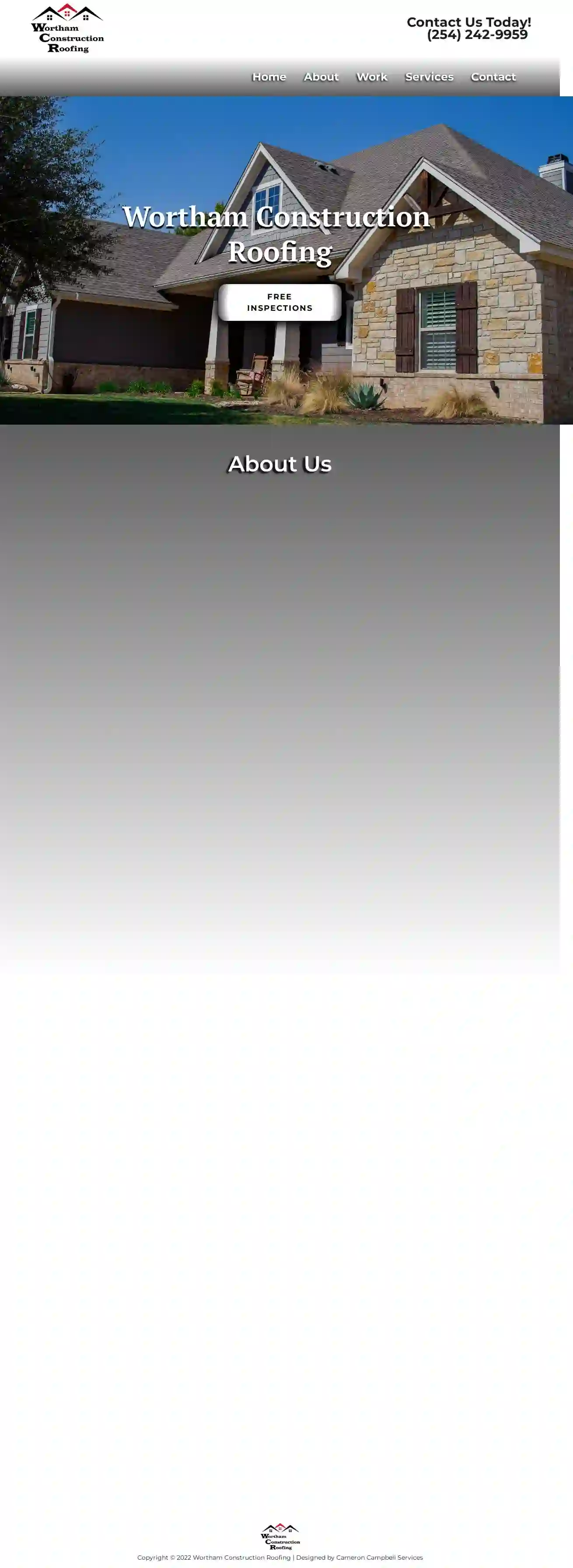Roofing Companies Gatesville
Find Roofing Services in Gatesville
Receive up to 3 Roofing Service quotes for your project today! Compare profiles, reviews, accreditations, portfolio, etc... and choose the best offer.

RA Roofing
57 reviews5926 S Staples St Suite C1-B, Corpus Christi, 78413, USRA Roofing is a top-rated roofing company serving Corpus Christi, TX, and the surrounding areas. We specialize in residential and commercial roofing, offering a wide range of services including asphalt shingle, metal, and tile roofing. Our team of experienced roofers is dedicated to providing our clients with the best possible service, from initial consultation to final cleanup. We pride ourselves on our professionalism, quality workmanship, and competitive pricing. We understand that your roof is a vital part of your home or business, and we are committed to providing you with a roof that will protect you and your property for years to come.
- Services
- Why Us?
- Our Team
- Testimonials
- Gallery
Get Quote
Shield Roofing and Sheet Metal
521 reviews2415 Karbach St, suite 8, Houston, 77092, USShield Roofing and Sheet Metal is a family-owned and operated metal roofing company in Houston, Texas. We strive to provide quality materials and work that will leave our customers happy and satisfied. We manufacture our own sheet metal to give our clients the best quality materials at the best rates! Our purpose is to help one achieve their roofing and sheet metal projects in an economical, efficient, and effective manner. We offer a wide range of metal roofing services that are sure to meet the various needs of our customers. From commercial to residential, our team of qualified professionals can meet the requirements needed to successfully equip and install any type of roof. We provide metal roofing, aluminum roofing, aluminum shake & shingle, and standing seam roofing services across the greater Houston area. Shield Roofing and Sheet Metal is your top choice for Houston roofing. We are known as the best in Aluminum Shakes, Standing Seam Metal, and other types of roofs including composition or TPO that provide a durable weather-resistant shield from typical wear & tear like hail storms and thunderstorms.
- Services
- Why Us?
- Gallery
Get Quote
Wortham Construction Roofing
528 reviewsWaco, USWCR is a locally owned family business from China Spring, TX servicing the Central Texas area. We provide quality and professional roofing and interior/exterior remodeling services. WCR is owned and operated by Kevin Whitley and Lenny Wortham. They have been transforming homes since the business was established in 2008. Together they offer over 45 years of expertise in construction and roofing experience. At Wortham Construction and Roofing we deliver the best project possible without cutting corners. Our sales staff double as the production manager so you deal with the same person from beginning to the end of the project!
- Services
- Why Us?
- Our Team
- Gallery
Get Quote
Apex Construction Group
5127 reviewsApex Construction Group, Dallas, TX 75001, 123 Main St, 75001, USApex Construction Group is a locally owned and operated residential and commercial roofer in Dallas, TX. For over 13 years, we've been known for offering the DFW area roofing repairs, roof installations, skylights, and gutter installations that are exceptional in quality. 90% of our business comes from customer reviews – a testament to the quality of work we put into every job. We have been successfully providing roof repair and replacement services in Dallas/Fort Worth for over 13 years. Our team of roofing professionals will help guide you from start to finish. No need to worry about any aspect of your roofing project or replacement. Enter your information and one of our roofing professionals in Dallas/Fort Worth, Texas will be in contact with you soon. Get a Free Inspection! 100% privacy Guaranteed.
- Services
- Why Us?
- Accreditations
- Our Team
- Testimonials
- Gallery
Get Quote
Apex Roofing Co
51 reviewsCollege Station, USApex Services Co is a leading provider of home improvement and maintenance services across the United States. Our team of skilled professionals is dedicated to delivering high-quality solutions for all your needs, from air duct cleaning and dryer vent cleaning to chimney sweep, roofing, water damage, and garage door repair and installation. We understand the importance of a clean and well-maintained home, and our services are designed to improve the air quality, safety, and efficiency of your property. We pride ourselves on exceptional customer service and quality workmanship, using only the best materials and equipment to ensure your complete satisfaction.
- Services
- Why Us?
- Gallery
Get Quote
Above All Roofing Solutions
52 reviewsKilleen, USABOVE ALL ROOFING SOLUTIONS Servicing Central Texas We provide commercial roofing services including repair and new installations. Some of our popular services include: Spray Foam Fabric Reinforced Membrane Roofing Metal Restoration PVC Roofing Patching and Other Repairs Let’s work together on your next Roofing project Whether you are needing a new roof or need to patch up an existing roof, Above All Roofing Solutions is ready to go!
- Services
- Why Us?
- Testimonials
- Gallery
Get Quote
Spire Roofing Solutions
5112 reviewsCollege Station, US- Services
- Why Us?
- Gallery
Get Quote
Sunley Roofing, Inc.
57 reviews2274 McKinnie Road, Springfield, 62707, USWe are licensed, bonded, and insured (IL Commercial License Number 104-015867). Expert Roof Installation and Repair. Sunley Roofing, Inc. is a third generation roofing company that has been proudly serving Sangamon County and the surrounding area with their residential and light commercial roofing needs. We are licensed, bonded, and insured (IL Commercial License Number 104-015867) for your peace of mind. When storms hit our area, we are your locally licensed roofing contractor of choice in the Springfield, Illinois area. Be wary of out of state roofers, go local and make sure the job is done right. Call us today to learn more or to schedule a roof inspection if you suspect there could be some damage. Outstanding Roof Materials Installed by Pros. We use the best products in the business including Owens-Corning and Tamko. Being a certified installer of these products means we know every detail and have been well-trained in the proper installation of your new roof. When you combine the superior products with a roofing company that has spanned over 3 generations, you will be very pleased with the results. Let’s talk. Call us today to schedule some time with us.
- Services
- Why Us?
- Our Team
- Testimonials
- Gallery
Get Quote
Alleycat Roofing
54 reviewsAlley Cat Roofing Corpus Christi, TX 78414, Corpus Christi, 78414, USAlley Cat Roofing is a trusted roofing contractor serving Corpus Christi, TX and the Austin Metroplex Area. We specialize in a wide range of roofing services, including roof replacement, repair, reroofing, gutter replacement, and window installation. Our team of experienced professionals is dedicated to providing high-quality workmanship and exceptional customer service. We understand that your roof is a vital part of your home or business, and we strive to protect your investment with durable and reliable solutions. Whether you need a new roof, repairs, or maintenance, Alley Cat Roofing is here to help. We pride ourselves on our honesty, transparency, and commitment to exceeding your expectations.
- Services
- Why Us?
- Testimonials
- Gallery
Get Quote
Integrity Roofing and Construction
517 reviews2300 George Dieter Drive, El Paso, 79936, USAt Integrity Roofing and Construction, we take immense pride in our 20 years of experience as a professional roofing and remodeling company serving El Paso, TX, and the surrounding areas. As a family-owned and operated business, we understand the value of trust, integrity, and delivering exceptional results for our clients. Our mission is simple: to provide you with top-notch roofing, remodeling, and exterior home solutions that exceed your expectations. With our unwavering commitment to professionalism and high-quality craftsmanship, we aim to transform your vision into reality, making your dream home a tangible and breathtaking space.
- Services
- Why Us?
- Accreditations
- Our Team
- Testimonials
- Gallery
Get Quote
Over 17,196+ Roofing Contractors on our directory
Our roofing experts operate in Gatesville and beyond!
Roofyng.com has curated and vetted the Best Roofing Contractors arround Gatesville. Find the most reliable contractor today.
Frequently Asked Questions About Roofing Companies
- Regular Inspections: Inspect your roof at least twice a year for signs of damage or wear and tear.
- Gutter Cleaning: Clean gutters and downspouts regularly to prevent clogs and ensure proper drainage.
- Tree Trimming: Trim overhanging branches to avoid damage from falling debris and reduce shade, preventing moss growth.
- Proper Ventilation: Ensure good attic ventilation to regulate temperature and moisture.
- Timely Repairs: Address any damage promptly to prevent escalation.
- Safety First: Avoid going onto the roof during a storm, as it's dangerous.
- Document the Damage: Take photos and videos of the damage for insurance purposes.
- Contact Your Insurance Company: Report the damage to your insurance company as soon as possible to initiate a claim.
- Temporary Repairs: If safe, address any immediate leaks using buckets or tarps to minimize further damage.
- Contact a Roofing Contractor: After the storm, have a qualified roofing contractor inspect the roof and provide a repair estimate.
- Age: If your roof is nearing or exceeding its expected lifespan, it's wise to consider replacement.
- Multiple Leaks: Several leaks or leaks that reappear after repairs suggest a widespread problem.
- Extensive Damage: Large areas of damaged, missing, or deteriorated roofing materials might be too costly or difficult to repair effectively.
- Sagging or Structural Issues: Sagging, deflection, or other structural issues indicate a compromised roof that needs replacement.
- Granule Loss (Asphalt Shingles): Significant granule loss indicates weathering and reduced protection.
- Curling or Buckling Shingles: Signifies age or improper ventilation.
- Increased Energy Bills: A poorly insulated roof can lead to higher heating and cooling costs.
How do I prevent roof damage?
What is fascia, and why is it important?
What should I do if my roof is damaged in a storm?
What are the signs that my roof needs to be replaced?
How do I prevent roof damage?
- Regular Inspections: Inspect your roof at least twice a year for signs of damage or wear and tear.
- Gutter Cleaning: Clean gutters and downspouts regularly to prevent clogs and ensure proper drainage.
- Tree Trimming: Trim overhanging branches to avoid damage from falling debris and reduce shade, preventing moss growth.
- Proper Ventilation: Ensure good attic ventilation to regulate temperature and moisture.
- Timely Repairs: Address any damage promptly to prevent escalation.
What is fascia, and why is it important?
What should I do if my roof is damaged in a storm?
- Safety First: Avoid going onto the roof during a storm, as it's dangerous.
- Document the Damage: Take photos and videos of the damage for insurance purposes.
- Contact Your Insurance Company: Report the damage to your insurance company as soon as possible to initiate a claim.
- Temporary Repairs: If safe, address any immediate leaks using buckets or tarps to minimize further damage.
- Contact a Roofing Contractor: After the storm, have a qualified roofing contractor inspect the roof and provide a repair estimate.
What are the signs that my roof needs to be replaced?
- Age: If your roof is nearing or exceeding its expected lifespan, it's wise to consider replacement.
- Multiple Leaks: Several leaks or leaks that reappear after repairs suggest a widespread problem.
- Extensive Damage: Large areas of damaged, missing, or deteriorated roofing materials might be too costly or difficult to repair effectively.
- Sagging or Structural Issues: Sagging, deflection, or other structural issues indicate a compromised roof that needs replacement.
- Granule Loss (Asphalt Shingles): Significant granule loss indicates weathering and reduced protection.
- Curling or Buckling Shingles: Signifies age or improper ventilation.
- Increased Energy Bills: A poorly insulated roof can lead to higher heating and cooling costs.